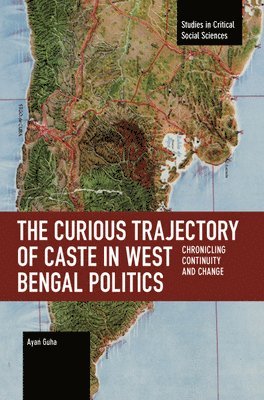
- Format
- Häftad (Paperback / softback)
- Språk
- Engelska
- Antal sidor
- 312
- Utgivningsdatum
- 2023-09-29
- Förlag
- Haymarket Books
- Medarbetare
- Schierup, Carl-Ulrik (ed.)
- Illustrationer
- Illustrations
- Dimensioner
- 229 x 152 x 17 mm
- Vikt
- Antal komponenter
- 1
- ISBN
- 9798888900123
- 418 g
The Curious Trajectory of Caste in West Bengal Politics
Chronicling Continuity and Change
- Skickas från oss inom 7-10 vardagar.
- Fri frakt över 249 kr för privatkunder i Sverige.
Passar bra ihop
De som köpt den här boken har ofta också köpt The SWOT Analysis: Using your Strength to overc... av Lawrence G Fine (häftad).
Köp båda 2 för 625 krKundrecensioner
Fler böcker av författarna
-
Nation i ombildning : Essäer om 2000-talets Sverige
Aleksandra Ålund, Carl-Ulrik Schierup, Anders Neergard, Magnus Dahlstedt, Lisa Kings
-
Migration, Citizenship, and the European Welfare State
Carl-Ulrik Schierup, Peo Hansen, Stephen Castles
-
Migration, Precarity, and Global Governance
Carl-Ulrik Schierup
-
Migration, Civil Society and Global Governance
Carl-Ulrik Schierup, Branka Likic-Brboric, Ral Delgado Wise, Glay Toksz
Recensioner i media
"Through meticulous research and balanced analysis, this book critically examines Bengal's claim to caste exceptionalism. It is the most analytically sound and theoretically grounded book on the subject that I have read in recent years. Everyone interested in the sociology and politics of caste in Bengal must read it." Sekhar Bandyopadhyay, Emeritus Professor of History, Victoria University of Wellington, New Zealand "This book is an important contribution to the burgeoning literature on caste in contemporary West Bengal, a state long considered as 'exceptional' for being caste-blind and not having an overtly castebrutal society. The book will remain a valuable testimony of a time when dalit politics is torn between callings of radical autonomy and conquests of Hindutva hegemony." Dwaipayan Bhattacharyya, Professor, Centre for Political Studies, Jawaharlal Nehru University, New Delhi, India "Ayan Guha has written an important and insightful book elucidating the complex trajectories of caste practice, politics and consciousness in West Bengal. Compelling reading for those interested in caste, representation and politics in India." Hugo Gorringe, Senior Lecturer of Sociology and Co-director, Centre of South Asian Studies, University of Edinburgh, United Kingdom
Övrig information
Ayan Guha, Ph.D is an Assistant Professor of Political Science at Jamia Hamdard, New Delhi. He is also currently associated with the York Centre for Asian Research, York University, Toronto as an External Research Associate. He has published extensively on caste and dalit politics.
Innehållsförteckning
Acknowledgements List of Tables 1Introduction Setting the Agenda of Analysis 1Posing the Problem: West Bengals Exceptionalism 2Contemporary Critiques of West Bengals Exceptionalism 3Research Rationale 4Thematic Outline and Approach 2Caste and Nature of Political Mobilization Emerging Trends 1Rise of the Matua Factor 2 bjps Matua Outreach: A New Relationship 3Politics of Memory and Political Narrative 4Contextualising Dalit Mobilisation in West Bengal 5Interplay of Memory and Politics at the Grassroots 3Analysing Patterns of Political Representation Continuity or Change 1Explaining Rise of Caste Hypothesis 2Two Concepts of Representation: A Brief Theoretical Exploration 3Mapping Trends of Political Representation in West Bengal 4Decoding Political Outlook towards Representation 4Caste and Politics of Numbers Delving Deep into Demography 1Demographic Fragmentation of Caste Groups 2Geographic Concentration of Caste Groups 3Demography and Political Aggregation of Caste Interests 5Material Basis of Caste Putting Political Economy into Perspective 1Caste and Economic Aspects of Identity Politics 2Caste Identity and Patterns of Landholding 3Caste and Relative Deprivation 4Land and Agrarian Politics 5Other Economic Indicators 6Economic Development and Politics of Caste Coalition 6Micro-politics in Rural Society Social Imagination, Political Culture and Economic Reality at the Grassroots 1Existing Findings about Micro-Dynamics of Caste in West Bengal: An Overview 2A Note on Methodology 3Geography and Demography of the Village under Study 4Caste and Class: Converging, Diverging and Intersecting Identities 5Cultural Dynamics of Caste 6Locating Caste in Politics at the Grassroots 7Summing Up 7Unmasking Political Culture Workings of Cultural Dynamics in Mainstream Politics 1Bhadralok: Decoding the Sociological Category 2Emergence and Evolution of the Bhadralok 3From Culture to Politics: Tracing the Roots of Bhadralok Hegemony 4Dynamics of a Discourse: Political Culture in Operation 5Break from Past: Towards a Critical Juncture? 8Conclusion Summing Up Bibliography Index
Du kanske gillar
-
What's Your Dream?
Simon Squibb
Inbunden -
On Democracy
Robert A Dahl
Häftad


